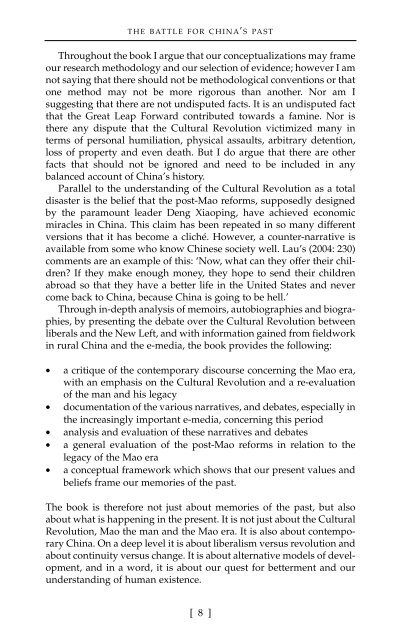Battle for China's Past : Mao and the Cultural Revolution
Battle for China's Past : Mao and the Cultural Revolution
Battle for China's Past : Mao and the Cultural Revolution
You also want an ePaper? Increase the reach of your titles
YUMPU automatically turns print PDFs into web optimized ePapers that Google loves.
THE BATTLE FOR CHINA’ S PAST<br />
Throughout <strong>the</strong> book I argue that our conceptualizations may frame<br />
our research methodology <strong>and</strong> our selection of evidence; however I am<br />
not saying that <strong>the</strong>re should not be methodological conventions or that<br />
one method may not be more rigorous than ano<strong>the</strong>r. Nor am I<br />
suggesting that <strong>the</strong>re are not undisputed facts. It is an undisputed fact<br />
that <strong>the</strong> Great Leap Forward contributed towards a famine. Nor is<br />
<strong>the</strong>re any dispute that <strong>the</strong> <strong>Cultural</strong> <strong>Revolution</strong> victimized many in<br />
terms of personal humiliation, physical assaults, arbitrary detention,<br />
loss of property <strong>and</strong> even death. But I do argue that <strong>the</strong>re are o<strong>the</strong>r<br />
facts that should not be ignored <strong>and</strong> need to be included in any<br />
balanced account of China’s history.<br />
Parallel to <strong>the</strong> underst<strong>and</strong>ing of <strong>the</strong> <strong>Cultural</strong> <strong>Revolution</strong> as a total<br />
disaster is <strong>the</strong> belief that <strong>the</strong> post-<strong>Mao</strong> re<strong>for</strong>ms, supposedly designed<br />
by <strong>the</strong> paramount leader Deng Xiaoping, have achieved economic<br />
miracles in China. This claim has been repeated in so many different<br />
versions that it has become a cliché. However, a counter-narrative is<br />
available from some who know Chinese society well. Lau’s (2004: 230)<br />
comments are an example of this: ‘Now, what can <strong>the</strong>y offer <strong>the</strong>ir children?<br />
If <strong>the</strong>y make enough money, <strong>the</strong>y hope to send <strong>the</strong>ir children<br />
abroad so that <strong>the</strong>y have a better life in <strong>the</strong> United States <strong>and</strong> never<br />
come back to China, because China is going to be hell.’<br />
Through in-depth analysis of memoirs, autobiographies <strong>and</strong> biographies,<br />
by presenting <strong>the</strong> debate over <strong>the</strong> <strong>Cultural</strong> <strong>Revolution</strong> between<br />
liberals <strong>and</strong> <strong>the</strong> New Left, <strong>and</strong> with in<strong>for</strong>mation gained from fieldwork<br />
in rural China <strong>and</strong> <strong>the</strong> e-media, <strong>the</strong> book provides <strong>the</strong> following:<br />
• a critique of <strong>the</strong> contemporary discourse concerning <strong>the</strong> <strong>Mao</strong> era,<br />
with an emphasis on <strong>the</strong> <strong>Cultural</strong> <strong>Revolution</strong> <strong>and</strong> a re-evaluation<br />
of <strong>the</strong> man <strong>and</strong> his legacy<br />
• documentation of <strong>the</strong> various narratives, <strong>and</strong> debates, especially in<br />
<strong>the</strong> increasingly important e-media, concerning this period<br />
• analysis <strong>and</strong> evaluation of <strong>the</strong>se narratives <strong>and</strong> debates<br />
• a general evaluation of <strong>the</strong> post-<strong>Mao</strong> re<strong>for</strong>ms in relation to <strong>the</strong><br />
legacy of <strong>the</strong> <strong>Mao</strong> era<br />
• a conceptual framework which shows that our present values <strong>and</strong><br />
beliefs frame our memories of <strong>the</strong> past.<br />
The book is <strong>the</strong>re<strong>for</strong>e not just about memories of <strong>the</strong> past, but also<br />
about what is happening in <strong>the</strong> present. It is not just about <strong>the</strong> <strong>Cultural</strong><br />
<strong>Revolution</strong>, <strong>Mao</strong> <strong>the</strong> man <strong>and</strong> <strong>the</strong> <strong>Mao</strong> era. It is also about contemporary<br />
China. On a deep level it is about liberalism versus revolution <strong>and</strong><br />
about continuity versus change. It is about alternative models of development,<br />
<strong>and</strong> in a word, it is about our quest <strong>for</strong> betterment <strong>and</strong> our<br />
underst<strong>and</strong>ing of human existence.<br />
[ 8 ]
















